Living alone, away from home and family, has implications. Biggest of them is the long distant relationship you get into. For me, the same has to be prized thrice every year, lest longing grows into despair. Pardon my exaggeration, but that’s how I feel my family behaves. This year was unfortunate in that sense. Due to unmanageable situations, I failed to report to my parents in time. The flip side of this ensued inception of something much bigger, broader, and wider!
This Blog is dedicated to the Idea; thought, and care of these people; to the system they developed, and their way of rediscovering India. Yes, this is what family time could do! It can open up your mind; rattle your idea of living; soften your take on what’s a ‘good life’. It can bring into perspective the different realms; stories and situations which others go through, often unheard of, often unvisited. These people, whom my father is friends with, have formed an informal group, called ‘Apasdariya’. ‘Apasdariya’ roughly translates to ‘cooperative living’. The group is populated with, a dozen or two, people from various fields; people united with a common interest in India’s, regional and national, literature and culture.
I still fancy and honor the essence from which this group was made. As per the core, the Indian authors do not talk of the veridical situations in their writings. A lot happens in common man’s life – Politics, economics, society, culture, and religion impacts life of an average Indian; however, their stories are one-sided, shallow, macro, and only highlight what’s pop. The pith was to expand and establish an itinerary lined close to reality. Real life, real situations, real locations, real names, and real struggle. To achieve the same every season they ventures to unknown; or lesser echoed – places, festivals, or destinations but of local importance; documenting, interacting and experiencing what’s vernacular. And every season after they have compiled their ‘rediscovery’, they publish it.
This monsoon, Apasdariya was heading to a village named Karde; situated in the district of Ratnagiri, on the Western Ghats of Maharashtra, India. As I happened to be in Mumbai, my parents thought it would great to meet me during this tour. They went a step ahead, and booked my tickets for the entire journey with the group! I do not welcome the Idea of ‘family time’ during ‘work’. For me holidays are to be relaxing. They are to be lazy, with family at home, perhaps doing nothing. Anything other than this isn’t a holiday, its excursion. I expect a day’s holiday after such outings. But this time it was literary my father’s tour.
 Karde is a coastal village, reaching which is a long journey. The group had to meet at Khed, a small beautiful railway station of the Konkan railways. It is a treat to travel through the Konkan valley in monsoons. The railway passes through various terrains and tunnels. If you like it away from the city then vistas from the journey are enough to keep you engaged entirely. Khed, as mentioned before, is a small station, it has two platforms and only a handful of trains stop here; However, I heard someone mention that it receives enough footfall that an escalator was soon to be installed! We reached there in the evening around seven. Outside the station was a very different world. Generally, such establishments encourage commercial encroachment of the real-estate around the transport station. Here there were around four mixed use, three-to-four story high, humble buildings. One could see they sky; the clouds, with rare annoyance of motor vehicle passing by.
Karde is a coastal village, reaching which is a long journey. The group had to meet at Khed, a small beautiful railway station of the Konkan railways. It is a treat to travel through the Konkan valley in monsoons. The railway passes through various terrains and tunnels. If you like it away from the city then vistas from the journey are enough to keep you engaged entirely. Khed, as mentioned before, is a small station, it has two platforms and only a handful of trains stop here; However, I heard someone mention that it receives enough footfall that an escalator was soon to be installed! We reached there in the evening around seven. Outside the station was a very different world. Generally, such establishments encourage commercial encroachment of the real-estate around the transport station. Here there were around four mixed use, three-to-four story high, humble buildings. One could see they sky; the clouds, with rare annoyance of motor vehicle passing by.
It took us around four hours through a superfast to reach khed; from there a mini bus was to carry us to Karde through Dapoli. I was told that Karde is around forty-five kilometers from khed; It took us two more hours to reach our destination. The roads were smooth, well maintained, and our bus was literally racing the wind. There was the moon shimmering through the clouds, illuming our journey. If you were to stop somewhere on the way, you would hear vocals from the woods, singing, whistling, and sometimes crying. They were distinctly wild, yet resonated with the overall lazy-adventurous mood.
We had to lodge in Karde’s first ever resort for the coming two days and three nights. It was overlooking the Arabian Sea, or should I rather rephrase it – it was besides the sea, with only a narrow nine meter road keeping us from the water! However, it was on the higher side of this area, it was on a mini hillock. The resort was constructed in early nineties, with a centric courtyard planning. We had to climb a lot, if we were to dine there, or even while heading to our room from sea-shore. Nevertheless climbing wasn’t taxing as the resort was split-leveled wisely. Our rooms were large, and airy opening to the sea, with one eternally hungry cat in balcony.
Day one was for us to contact the Panchayat. Panchayat is the political door to a village. There are two realms in a communities’ life. One is – formal, socio-economic, and political – How much does the population understands self, its land, and the larger context? How much does it earn, how does it earn, and to what degree can it economically support itself in dire situations? Who does it depends on? What are its long-term plans and strategy, if at all? These apart from all the other figures, and records one can think of are political in nature. The second part is – social, ethnic, and cultural. Realm second isn’t a bit informal; this is the vernacular definition the community gives to self – What is the social structure, and culture of the community? What are its values and virtues? How does it behave with foreign situations? How aware, open-minded, and accepting the community is towards its strength and shortcomings? How does the community think and act? For example – law and order is a local-political worry, whereas walking fearlessly is a social contribution; ‘Cleaning’ is a political-municipal task, but ‘not littering’ is a social virtue. It is interesting to know that sometimes the social structure is so lose that it starts burdening the political built-up in many India cities.
We walked towards the village center, I was in hope to see a panchayat carrying through decision of people. The Image in my mind was of a rotund tree surrounded by villagers, listening to some three-four panjandrums speaking from under the tree’s shade. We travelled through the end of this village, unable to find our destination. Upon retreating, we were diverted, I guess language does this. None of us knew Marathi, and the very few villagers we met; their dialect for Hindi was slightly alien. But finally we were in the right direction! And we reached…a primary school!? I didn’t understand as to why we landed at a primary school. However the built-environment there was enchanted. Imagine crossing a village lane, heavily occupied by wilderness and her foliage. Foliage growing at random, unchecked through the backyards, and courtyards of the locals. The Pitched roof houses had a raw, rugged appearance. Imagine crossing this raw state of affairs to a finely coated, decorated, and tidy space. From pale to beautiful, from silence to peaceful. There was humming in the air, there were little giggles here and there, there was aroma of fresh lunch being cooked nearby, and there was animation in the environment. Primary colors dictated this village square. There was a sense of freshness.
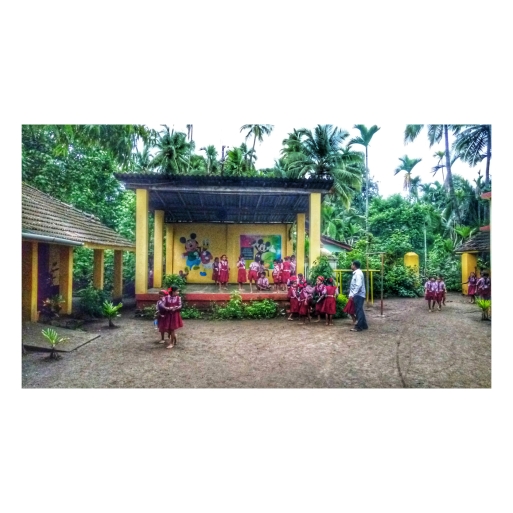
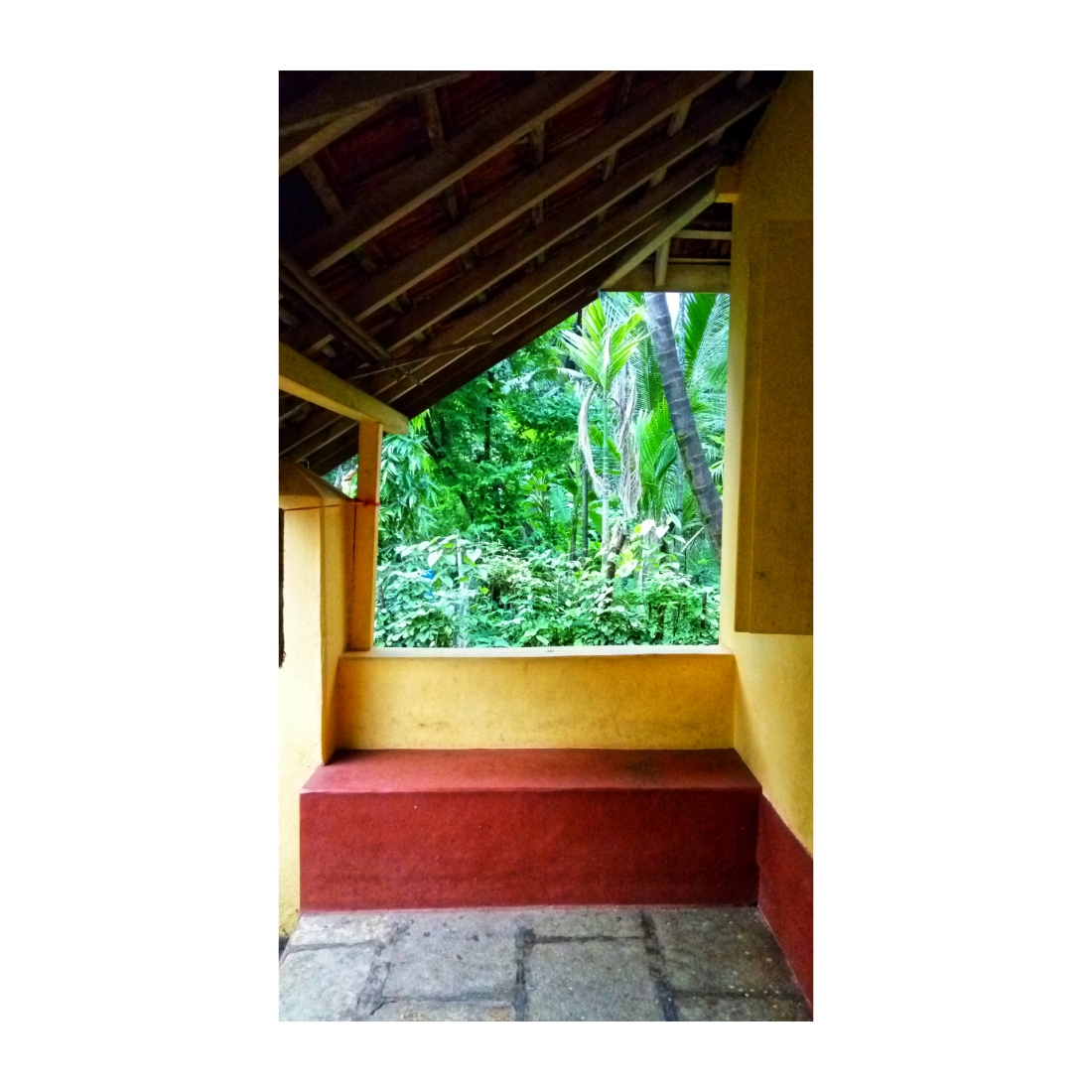 I still remember how dramatic this experience was for me. Transcending from raw to tender never felt so comforting. The feeling one gets on arriving home after their daily errands. Imagine a large pucca bright yellow hut. Doors and windows painted blue, with handmade decorations on the ceiling. Windows also took me by surprise, they were big, and many; It was airy and comfortable inside. The class room was tidy, I have been to other government schools, and know that keeping (alone) the classrooms tidy is a boastful affair. The campus had a decent playfield/courtyard, and a building dedicated for cooking and storing food. There were three other buildings for learning, and one office building for both the school and panchayat. There was covered porch, in the courtyard where the children ate. The school was in a pretty satisfactory condition. It was so by many standards. Education, pass percentage, minimum education per capita were a few, the food being provided was good, the area provided for children’s overall development, and the little equipment & labs needed were at disposal. The staff was educated and dedicated. There was discipline in children, and it didn’t appear as if they were struggling with it. Education wasn’t a burden on them, they were not scared to be there, rather they enjoyed. There was also a class being run by a monitor alone; you don’t expect a second grader to run a class, and exercise the honored duty of sounding the school bell. This was the case here! They were being pushed towards self-reliance. I had visited a government school after a long while, perhaps this was the new normal, or perhaps this hamlet was unique.
I still remember how dramatic this experience was for me. Transcending from raw to tender never felt so comforting. The feeling one gets on arriving home after their daily errands. Imagine a large pucca bright yellow hut. Doors and windows painted blue, with handmade decorations on the ceiling. Windows also took me by surprise, they were big, and many; It was airy and comfortable inside. The class room was tidy, I have been to other government schools, and know that keeping (alone) the classrooms tidy is a boastful affair. The campus had a decent playfield/courtyard, and a building dedicated for cooking and storing food. There were three other buildings for learning, and one office building for both the school and panchayat. There was covered porch, in the courtyard where the children ate. The school was in a pretty satisfactory condition. It was so by many standards. Education, pass percentage, minimum education per capita were a few, the food being provided was good, the area provided for children’s overall development, and the little equipment & labs needed were at disposal. The staff was educated and dedicated. There was discipline in children, and it didn’t appear as if they were struggling with it. Education wasn’t a burden on them, they were not scared to be there, rather they enjoyed. There was also a class being run by a monitor alone; you don’t expect a second grader to run a class, and exercise the honored duty of sounding the school bell. This was the case here! They were being pushed towards self-reliance. I had visited a government school after a long while, perhaps this was the new normal, or perhaps this hamlet was unique.
Primary schools function as political bureau for village panchayat. Take it as a measure for judicious resource management, this infrastructure has dual purpose. It works as a centre of education as well as record keeping. The Covered porch is where the sarpanch (village head) addresses the village, if at all needed. Here are all the record, numbers and demographic figures apart from the children. This is where you will head if you want to know anything related to political working, development, conflicts, etc. This is the political door to a village.
We were to dine at a local’s house, unfortunately the same couldn’t happen. However we were invited by a local resort owner for lunching at their property. On our way, we came across many resorts, and all of them were fitted with large black water boilers. These boilers would heat water, using wood as fuel. To me this was a new sight. As power cuts were regular, these boilers were widely used. We had an exquisite lunch. Exquisite not because it was at a resort, but because it was copious in quality. Ours was a regular thali (loosely defined as meal combo), but the cookery, the ingredient, and the taste was predominately contextual. A vernacular experience, a savor one wouldn’t easily find elsewhere. It was a thali – heavy, and planted with quality & diversity.
The evening tea was at another local’s house. By good fortune this plan was a go. Meeting locals, eating & dinning with them was of importance for this tour. This was for us to read them, their thoughts, and to discover their daily lives. We were guest to a young, newly married, lady who worked at the resort we bore in. Her house was on the hills nearby. Way to which crossed though lush green paddy fields. Have you ever seen wind glide though such fields? It was as smooth as blowing dandelions. It was swift & discrete. Wind would whirl the bunch and then make them stand. Have you ever petted a fluffy dog? That’s how palpating it felt. It was green and serene. One could hear gushing of water nearby; nearby was a stream, we had to climb up parallel to it for meeting at our host’s residence. The road kept narrowing till it was only a lane wide. It was tranquil in itself to reach her. We had left in groups, mine was just a pair, and we were the second pair to her house. As majority were yet to arrive, in place of waiting we stepped down into a check dam of the rivulet near her property. This was a seasonal stream, which didn’t have the volume to fill up the catchment we trod into. Like naughty children, we hid awaiting the rest.
Seeing no one arrive, tired, we finally left for her house.
We were around fifteen who were invited, of which only 10 or so made it. However we were greeted with twenty plus cups of tea! That’s an oversized heart! Our hosts stayed with her in-laws. Her husband worked for a Jain caterer in Mumbai. He would come once in a blue moon. If she wanted to call him, she needed to climb a nearby hillock for better cellular signals. She was young, married yet couldn’t stay with her husband. But that didn’t arrest her from populating her life happily. She worked, took care of the house, took care of the farms, and also of her duties as daughter-in-law. Theirs was a huge house. It had farms all around it, yet this was not their only house. They had one in another hamlet nearby. They had an old Maruti 800, and a couple of new bikes & two-wheelers. I didn’t really empathize the want for anyone to leave all of this aside for a straining job in Mumbai. His job, as we were told, didn’t have the concept of holidays; all the more reason for me to wonder! Perhaps his pay was good, perchance the growth was calling.
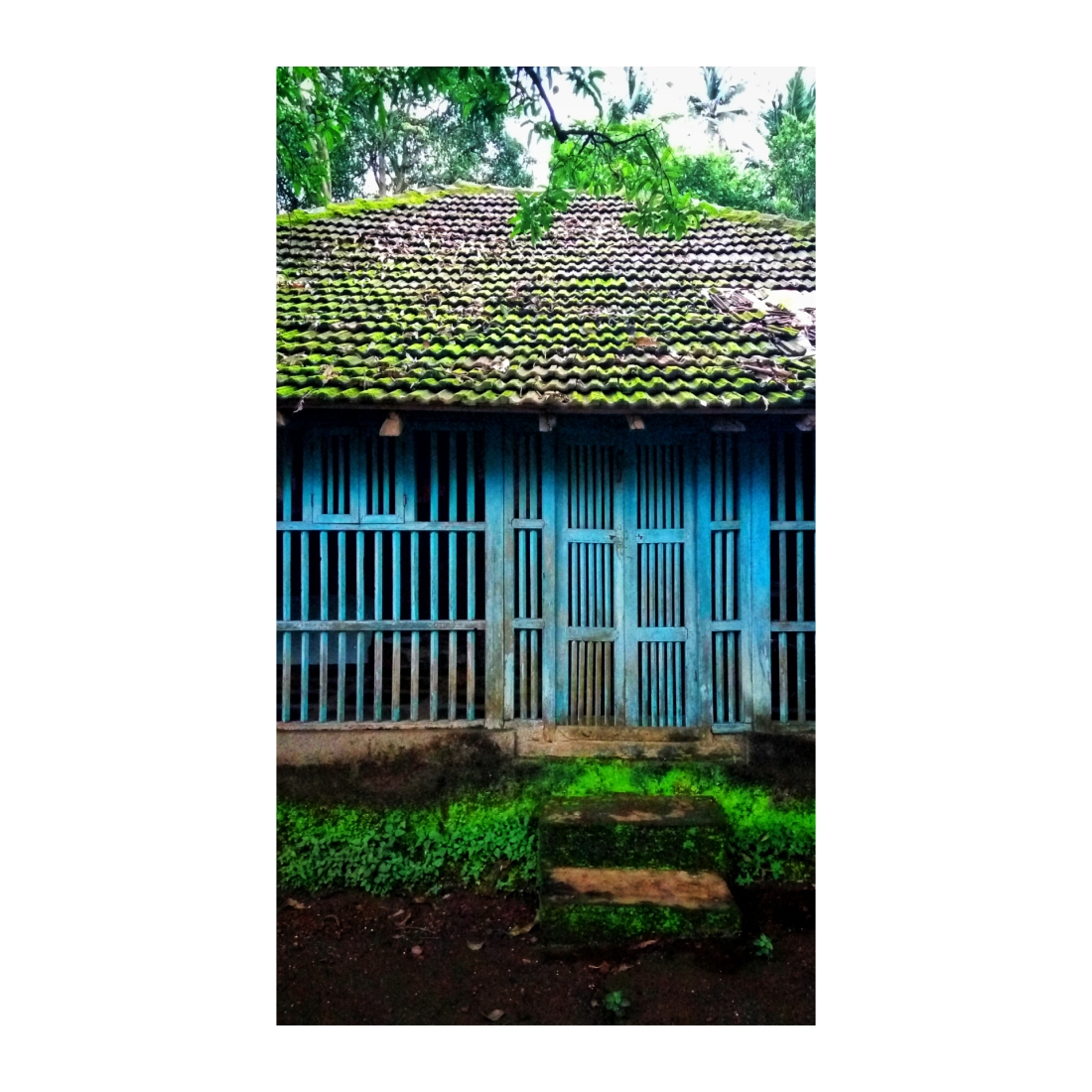 We were all hiking for understanding and observing the surroundings. While travelling towards the panchayat we had come across a delta; the rivulet flew through the village and met with the sea. Not to mention, the sea was always by our side during our short trip. In the morning, the sea was forcing itself into this delta, pushing the river upwards the mountain. While we returned, the tide was low, and now it was the rivulet finding her way back into the Arabian. For me, this was the first time I had witnessed a delta. Keep aside seeing a delta, during low tides, I could truck through it! The sea, beaches, and the delta were all clean and unadulterated. The beach however had dark mud, making it appear dirty from far-off, but one would miss-out on a lot if they were to trust their eyes alone. There was no one to dirty the surroundings. Second astonishment, even though it was a rare sight, was how you would still find people making love on the beach! Just let the evening sink in, the rocks, the water and the sand would engulf you, giving you your little space. Here perhaps, it wasn’t the lack of real-estate, ‘my-space’, or privacy as in case of cities such as Mumbai, but the idea of adventure-led-romance. It was dark, with the sea thrusting itself over the shore and nothing more.
We were all hiking for understanding and observing the surroundings. While travelling towards the panchayat we had come across a delta; the rivulet flew through the village and met with the sea. Not to mention, the sea was always by our side during our short trip. In the morning, the sea was forcing itself into this delta, pushing the river upwards the mountain. While we returned, the tide was low, and now it was the rivulet finding her way back into the Arabian. For me, this was the first time I had witnessed a delta. Keep aside seeing a delta, during low tides, I could truck through it! The sea, beaches, and the delta were all clean and unadulterated. The beach however had dark mud, making it appear dirty from far-off, but one would miss-out on a lot if they were to trust their eyes alone. There was no one to dirty the surroundings. Second astonishment, even though it was a rare sight, was how you would still find people making love on the beach! Just let the evening sink in, the rocks, the water and the sand would engulf you, giving you your little space. Here perhaps, it wasn’t the lack of real-estate, ‘my-space’, or privacy as in case of cities such as Mumbai, but the idea of adventure-led-romance. It was dark, with the sea thrusting itself over the shore and nothing more.
The same night, our dinner was planned at the ‘sarpanch’s’ house. We knew he lived close to the primary school, but exactly where none know. From the lady’s house to the panch’s house, we walked. We walked through the village, I guess some portion of village had encroached the bed of the water stream, so we walked though water-bed as well. No Street lights, no lanterns whatsoever, no electric torches to light up our evening drift, only villagers here and there. I wasn’t even aware of this run. We arrived at a mixed use building without boundary walls. We were to walk through it, to reach a little colony behind, which was otherwise unapproachable through any other means. There were many cats & dogs, though neither felt threatened with other’s presence. Unfortunate for us, due to some reasons, the host was unavailable. His family however took care for us. They, like the lady of the hills, had a pucca house; however, flooring of both the houses was an organic mix of mud and cow-dung. Bath areas, and toilet of the Panch’s house were separate, adhering the traditional Indian practice.
It was around ten in the night; we still had to jaunt back to our resort. Thereon, even at this hour, we would find someone or the other out. To our surprise, it wasn’t a taboo if it was a women. We saw children, girls, playing that late at night. One of those girls even coached, taking selfies to, the senior most member of our group. Innocent as it appears, what we did pick up from this was how this village regaled its women. They were fine with her playing at night, she wasn’t at all worried or hesitant with a total stranger approaching her. Not only freedom prevailed, but also confidence, and this does not transpire without a strong community ownership. These virtues were inviolably a convention for them.
The village had a history of sending its male counter parts to Mumbai. These were the times when mills flooded and flourished in the commercial capital of India. Men would use the sea to reach, work, and stay in the city of dreams. This was also the time when various ‘lunch homes’ popped up in Mumbai, serving cuisines local to the various Maharashtra villages. So like other villages, not only did Karde send men to work, but also men to cook for them. They ended up exporting local cuisine and knowledge, with this commercial opportunity. Trade and commerce rightly helps in spreading culture.
For years the village would run on the money-orders from Mumbai. Only Women, children, elderly and a few selected men stayed back. There were large tracks of farm land, which would be taken up by those who stayed. But this ended with mills shutting down. In terms of women empowerment, I wonder to what degree has the condition deteriorated or improved since then. Though that night we knew Karde was amongst the better of the cultures out there. We were told this was the case of most of the Maharashtrian villages.
Our day wasn’t over yet. Much to my surprise there was more to happen! Once we reached the resort and refreshed, we had to gather for a round of poems! This was the time when members had to recite a poem they wrote, or remembered, or anything on-the-scene based on the day’s learning. Luckily I didn’t have to perform; I had nothing on me. However there was a good deal to listen to. Many recited their poems on the settings of monsoon, village life, beaches, and coastal areas. Many cued us of the lyrical work left by the great poets of the era by-gone. I regretted not recording any of it.
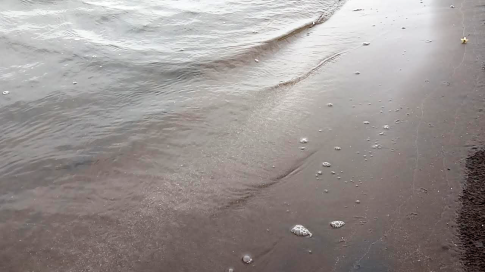 Day two was a travel tour to nearby areas – a city, university, and a harbor. We were in our traveler, heading to Harnai, a small harbor village in Dapoli. Dapoli is a town in Ratnagiri; Dapoli also acts as the taluka headquarters for smaller towns and villages nearby, including Karde. It took us around half an hour, via the harnai-palande road, for a ten kilometer journey. On the way we had come close to a river, which formed a larger delta, flowing into Arabian sea. Much to my surprise, the locals didn’t have a name for it. May be we couldn’t ask the right question. The delta was large enough to be categorized as a beach. Not only I, but also the group was in awe of the vista in front of us. We decided to take a stroll over this patch of natural wonder. We were up and close to the union of an unsung river with a cognized sea. Pertaining to the low tide, the union was peaceful. At the shore currents of the river touched, and pushed further themselves running parallel to the land mass. Beaches usually do not have parallel water currents, normally the sea thrust itself onto the beach. One could hear the stream’s monotonously lyrical swirls as it tried itself into the sea. The sea, still managed to grapple water in the diametric pole. Even though we couldn’t see, but knew somehow-somewhere, the river was free of the land.
Day two was a travel tour to nearby areas – a city, university, and a harbor. We were in our traveler, heading to Harnai, a small harbor village in Dapoli. Dapoli is a town in Ratnagiri; Dapoli also acts as the taluka headquarters for smaller towns and villages nearby, including Karde. It took us around half an hour, via the harnai-palande road, for a ten kilometer journey. On the way we had come close to a river, which formed a larger delta, flowing into Arabian sea. Much to my surprise, the locals didn’t have a name for it. May be we couldn’t ask the right question. The delta was large enough to be categorized as a beach. Not only I, but also the group was in awe of the vista in front of us. We decided to take a stroll over this patch of natural wonder. We were up and close to the union of an unsung river with a cognized sea. Pertaining to the low tide, the union was peaceful. At the shore currents of the river touched, and pushed further themselves running parallel to the land mass. Beaches usually do not have parallel water currents, normally the sea thrust itself onto the beach. One could hear the stream’s monotonously lyrical swirls as it tried itself into the sea. The sea, still managed to grapple water in the diametric pole. Even though we couldn’t see, but knew somehow-somewhere, the river was free of the land.
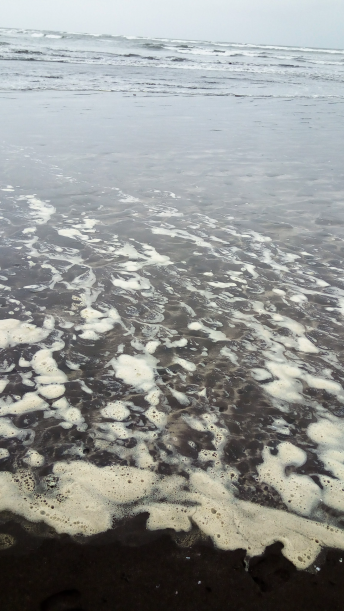 Here at the beach, surfs brought with them some off-shore spume. Spume or sea-foam is formed when the sea is churned. Sea water contains dissolved minerals and organic matter, and when agitated creates ‘foam’. Spume largely is composed of broken algal blooms (the turquoise layer over stagnant water bodies). Now most of the sea foam isn’t dangerous; however, when Spume comes in contact with wastes, toxins, and germs (which the populations are known thrown in); it becomes a hazard to living organisms. So one needs to be very careful before going anywhere near the foam, if it’s discolored.
Here at the beach, surfs brought with them some off-shore spume. Spume or sea-foam is formed when the sea is churned. Sea water contains dissolved minerals and organic matter, and when agitated creates ‘foam’. Spume largely is composed of broken algal blooms (the turquoise layer over stagnant water bodies). Now most of the sea foam isn’t dangerous; however, when Spume comes in contact with wastes, toxins, and germs (which the populations are known thrown in); it becomes a hazard to living organisms. So one needs to be very careful before going anywhere near the foam, if it’s discolored.
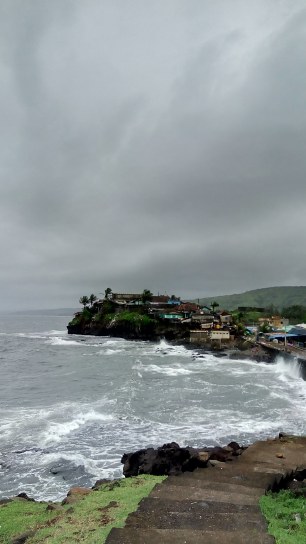
Harnai port was nearby. As this was the monsoon season, most of the boats were at the shore line, kept upside down. During Monsoons, the fishermen and their boats aren’t allowed in the sea. Though this is a protective measure taken for safeguarding lives, this also serves as breeding buffer for many fishes. The boats were to be deployed back into the sea from first of August. Nearby was a little mountain, connected via a partly fortified passage, from Shivaji Maharaj’s time. This passage behaved more like a bund wall, stopping the fierce sea from entering the fisher man’s bay, where their boats lay. One moment the waves would wash clean a shallow sea bed, the other moment fill it up above visual capacity. It thundered every time the waves hit the bund. We believed the hill to house a light house, but from close it didn’t appear to have any one. There was one yellow building with boundary walls and barbed wires. On the passage lay some broken instruments from I.M.D. (Indian Metrological Department). The building did have a large dish, and some antennas. Perhaps it was one of the many signaling posts of the company. From this hillock in the sea, one could easily locate a very large Island-fort. It was one of the many forts constructed by Shiva Ji in his times. Access to it was, via sea route, from a smaller fort nearby. As only boats could go there, and this was the monsoon season, all we could do was to gaze at it from where we stood.
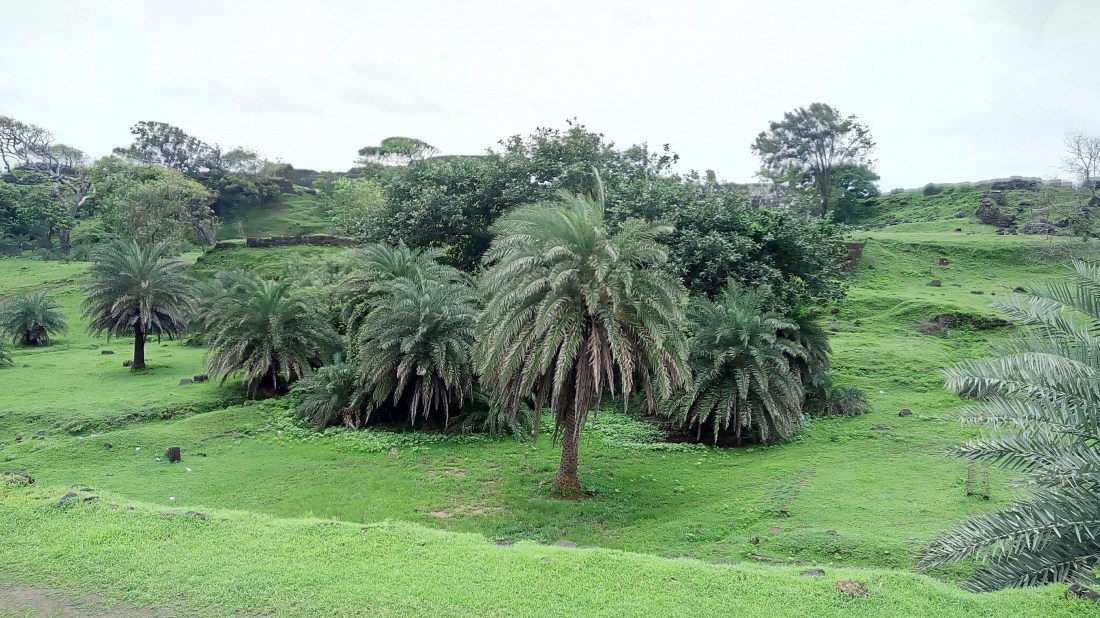
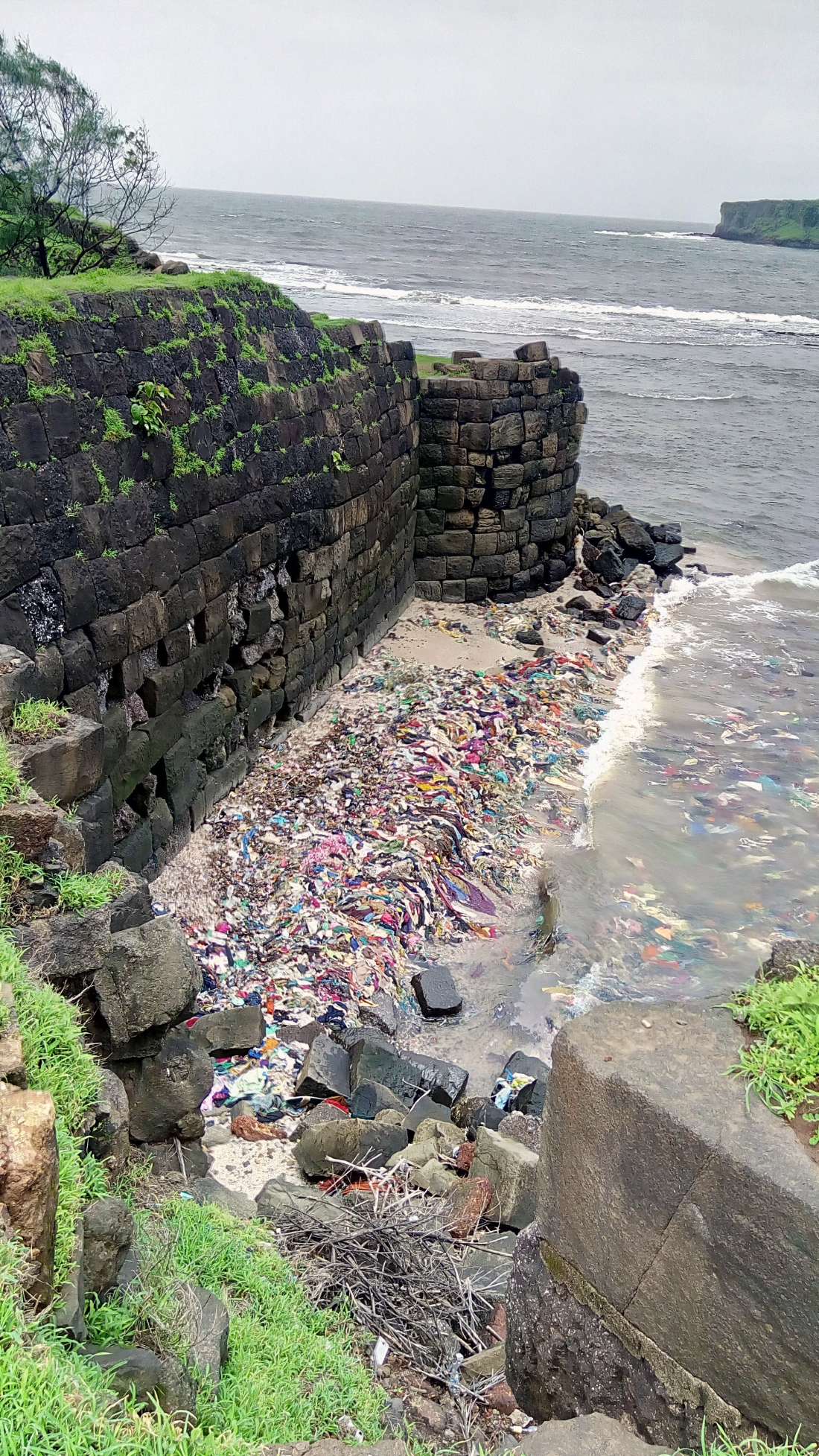 We did make it to the ‘gateway’ fort located on the land. It was an old mismanaged building, like the norm in India. There were unbelievably green fields inside. One could use the different levels for various functions. Towards our right was a staircase which led us to the terrace. Terrace was narrow, with a view spanning from the village to the island-fort far off. The fort, we were on, partly stood on water. One could locate a pool of fabric, torn, and dumped, at the junction where fort wall met with the sea. Someone had rightly said – “what we throw in the sea, the sea throws back”. The sea didn’t want any of those, all of them thrashed and shelved on that little piece of land. Our way out of the harbor led us through the village, and then further we climbed to a different destination. The roads swirled, to reach the top of the hill. While on the ‘hair-pin’ ascend; we learned that a lot of land, which was either used for agriculture, or simply held the flora and fauna of the mountain; was bought by a number of people from Mumbai. Such places are a get-away for people living in the unhealthy metropolitans of India. What I despise is that majority doesn’t acknowledge their social responsibility, after they have constructed their farm houses or holiday homes. Locals on the other hand get into an unsustainable land trade as they see opportunity to earn. A lot of these villages, or country side do not have strict bylaws governing construction, which only adds to the problem of deforestation and ecological damage.
We did make it to the ‘gateway’ fort located on the land. It was an old mismanaged building, like the norm in India. There were unbelievably green fields inside. One could use the different levels for various functions. Towards our right was a staircase which led us to the terrace. Terrace was narrow, with a view spanning from the village to the island-fort far off. The fort, we were on, partly stood on water. One could locate a pool of fabric, torn, and dumped, at the junction where fort wall met with the sea. Someone had rightly said – “what we throw in the sea, the sea throws back”. The sea didn’t want any of those, all of them thrashed and shelved on that little piece of land. Our way out of the harbor led us through the village, and then further we climbed to a different destination. The roads swirled, to reach the top of the hill. While on the ‘hair-pin’ ascend; we learned that a lot of land, which was either used for agriculture, or simply held the flora and fauna of the mountain; was bought by a number of people from Mumbai. Such places are a get-away for people living in the unhealthy metropolitans of India. What I despise is that majority doesn’t acknowledge their social responsibility, after they have constructed their farm houses or holiday homes. Locals on the other hand get into an unsustainable land trade as they see opportunity to earn. A lot of these villages, or country side do not have strict bylaws governing construction, which only adds to the problem of deforestation and ecological damage.
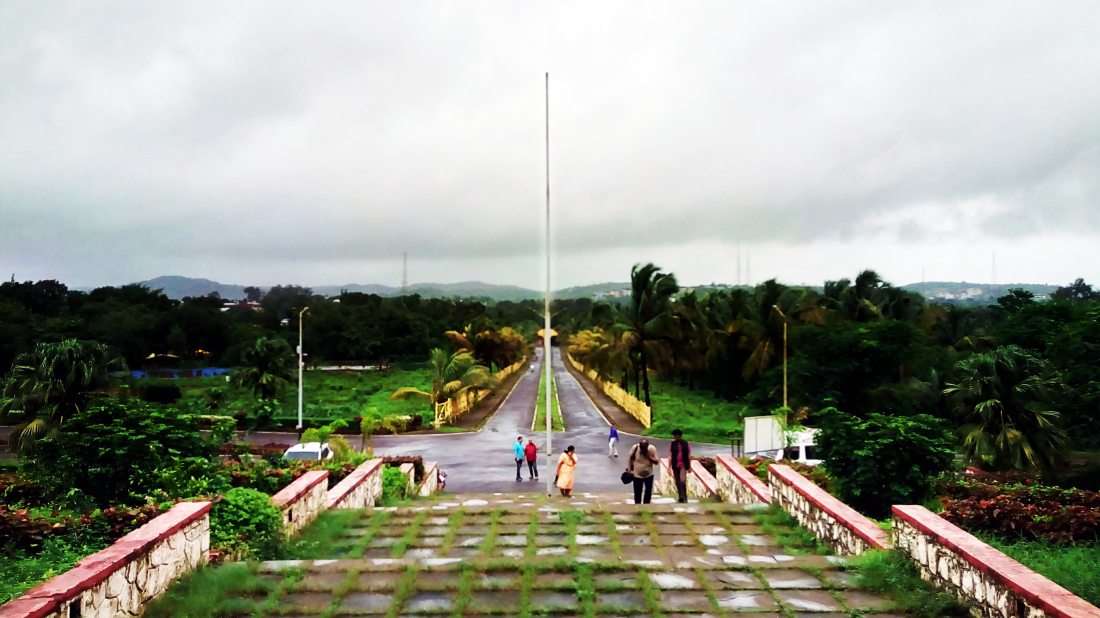 We were steering to Dapoli, our aim was the agricultural University, and the Market. The agriculture university, known as Dr. Balasaheb Sawant Konkan Krishi Vidyapeeth, is an eminent university in its field. It was established in the year 1972. Its research Centre has developed some indigenous patented variety of rice. What took my interest was their library. Being a government college, you don’t expect a top-notch infrastructure. Theirs was a digitalized library, with books being coded such that their whereabouts were digitally logged. The exit had sensors, the kinds you see in high-end clothing brands, they go off in case of shoplifting. Interiors were warm unlike the rugged appearance of external façade. Overall built structure was old, yet had an interesting architecture, providing it an identity of its own. An interesting fact that we learned was the Portuguese had first experimented with alphonso mango in this region, this is where the first grafting was done. The land and culture of this region gave way to technical advancement and research much before the establishment of this university. Librarian took us to a local eatery for lunch. Again this was our dig at understanding the local cuisine. Region being same, cuisine had little difference. But for me, for the first time did I have Aamrkhand! And some curries which I don’t remember.
We were steering to Dapoli, our aim was the agricultural University, and the Market. The agriculture university, known as Dr. Balasaheb Sawant Konkan Krishi Vidyapeeth, is an eminent university in its field. It was established in the year 1972. Its research Centre has developed some indigenous patented variety of rice. What took my interest was their library. Being a government college, you don’t expect a top-notch infrastructure. Theirs was a digitalized library, with books being coded such that their whereabouts were digitally logged. The exit had sensors, the kinds you see in high-end clothing brands, they go off in case of shoplifting. Interiors were warm unlike the rugged appearance of external façade. Overall built structure was old, yet had an interesting architecture, providing it an identity of its own. An interesting fact that we learned was the Portuguese had first experimented with alphonso mango in this region, this is where the first grafting was done. The land and culture of this region gave way to technical advancement and research much before the establishment of this university. Librarian took us to a local eatery for lunch. Again this was our dig at understanding the local cuisine. Region being same, cuisine had little difference. But for me, for the first time did I have Aamrkhand! And some curries which I don’t remember.
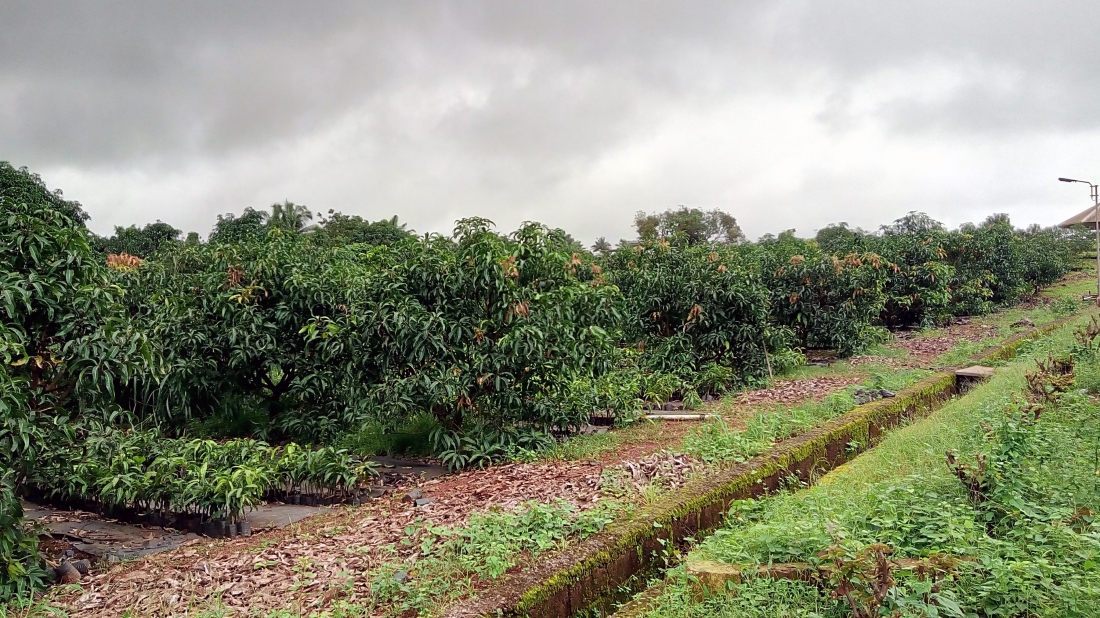 Nearby was a nursery developed as a collaboration between India and Israel, under the Indo-Israel Agriculture project. The project aimed at technically advancing production of Mangoes. The plantations in the nursery were adhering to the research and development from the project. Upon enquiring more, we learned that many private and government universities, research centers, and far off farmers come here for buying plants. Apart from Mangoes and rice, Dapoli region is also popular for cashew production.
Nearby was a nursery developed as a collaboration between India and Israel, under the Indo-Israel Agriculture project. The project aimed at technically advancing production of Mangoes. The plantations in the nursery were adhering to the research and development from the project. Upon enquiring more, we learned that many private and government universities, research centers, and far off farmers come here for buying plants. Apart from Mangoes and rice, Dapoli region is also popular for cashew production.
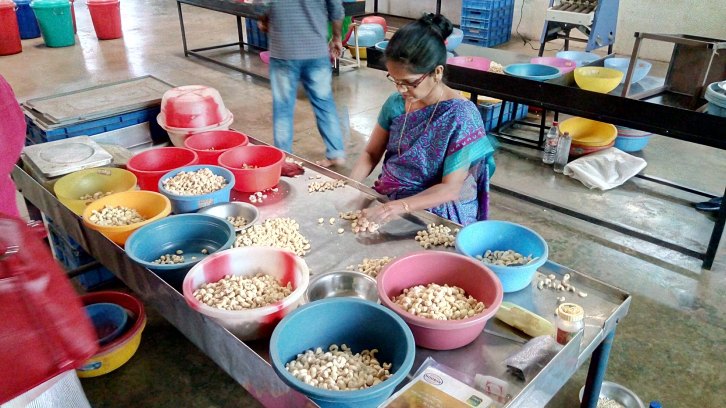
As part of our Dapoli visit, we had to visit a local cashew factory. There we were shown the production process starting from the raw fruit to the finished-packed cashew boxes. A fun fact, quality of cashew is decided based upon its physical appearance. Fourth step in production is segregation of cashew. Cashews are manually segregated based on – how many dents they have, and their colour tone; that’s it! They all taste the same!
Having visited the university, nursery, and the factory, only one task remained. We had to now loiter in the market to gauge it. We were short on time, with a chore to accomplish. Some of us had purchased mango plants, they had to return via airways and needed adequate packaging for the plants. This was our motive. We would disperse in smaller groups, go here and there, enquire with people, interact with them, and try to figure out if we could be helped. Market had quite a few buildings from the British era still standing strong. Dapoli had three wheelers, with lockable gates in them! The area we were in was planned in a grid, and so losing track of our members wasn’t an issue at all. Recently a ban on plastic was imposed in Maharashtra, the same was being respected by the locals, and even the street side vendors didn’t encourage using plastic bags. So when my mom stood stupefied after buying fruits, I was there prepared, equipped, and all set with a cloth bag, to her rescue. However, none of us could find the right packaging, a lot of shopkeepers tried helping us with something makeshift but noting satisfactory. As a belated thought It struck me, an electro-stat (Desi jugad for the term ‘electronic-stationery & Xerox’) is what we should have searched for, for their paper-roll boxes were of the right dimension for our plants.
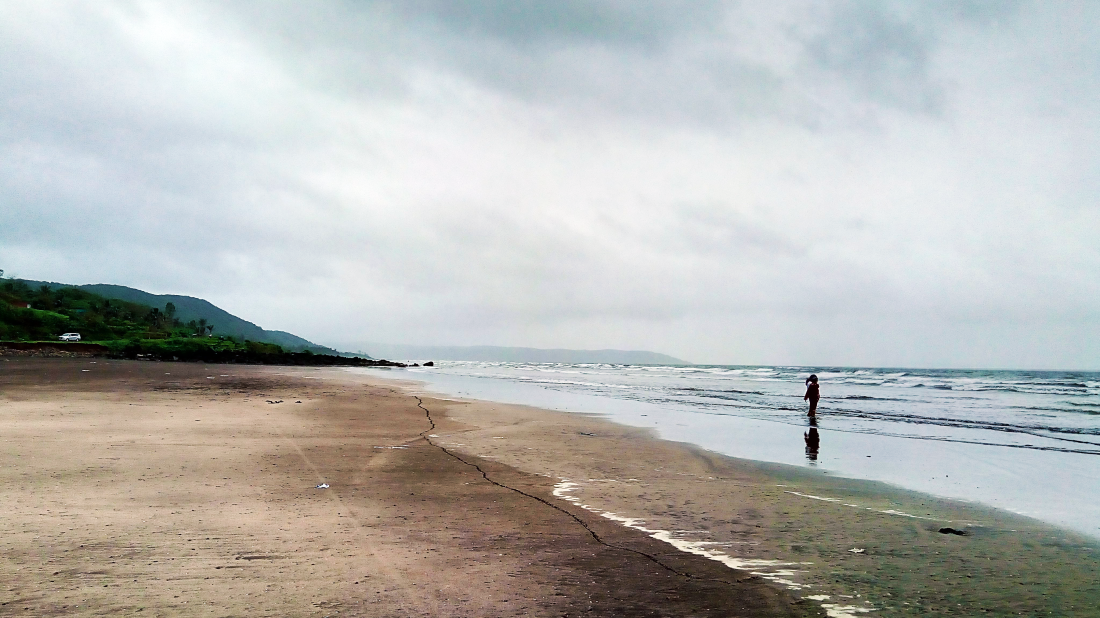
The day was long and tiresome, I hit the bed right away, even though it was just five in the evening. My mother on the other hand wanted to go to the beach and collect sea shells. A day before when we were visiting the locals, she had gone to a beach nearby. She saw sea shells spread all over somewhere on the beach. It was tempting for her, because such sights are rare. It was only possible as beaches of Karde do not receive the footfall which other known beaches do. It took me some time, but finally we were out on the road, walking towards that ‘beach’. Upon arriving, I was awestruck! The beach was mesmerizing. There was just four to five of us. The evening had enchanted the area. The tide was low and thus a broad fair portion of beach was open for us to walk onto. One would only find dark mud closer to the land, but fine white sand towards the sea. My mother and brother dropped their shoes and started sparking north. Sea was calm and would occasionally send in waves, waves as flat as a bed sheet. Imagine a thin layer of water shimmering thought under your legs. At times, it appeared as if we were walking on water. They walked further till my mother reached a rocky portion of the beach. These rocks weren’t one over another, it felt as if someone had sown them individually in the sand. They formed a shallow valley around their corners, filled with water. Like a moat of a castle. The valley was beaded with sea shells, outwards from the rocks, also under the clear-clean-see through water. It was an exotic setting. Far-off in the background of these rocks, on one side you would see lush green trees, and the other side will be the horizon dusking. Dusk felt more like dawn, it was that blue, light blue, cooler blue. This was an oasis in the corner of this beach. This is what happens when people do not encroach the natural territory. Miracles happen! We were so engrossed in the scene, that none of spoke a word while we were there. It was the rising tide which set us back, otherwise, we could have stayed there for hours and hours cherishing and wondering.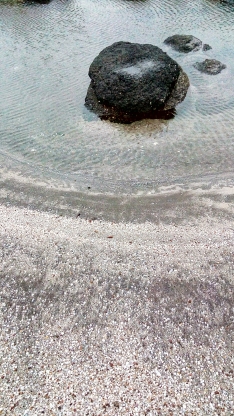
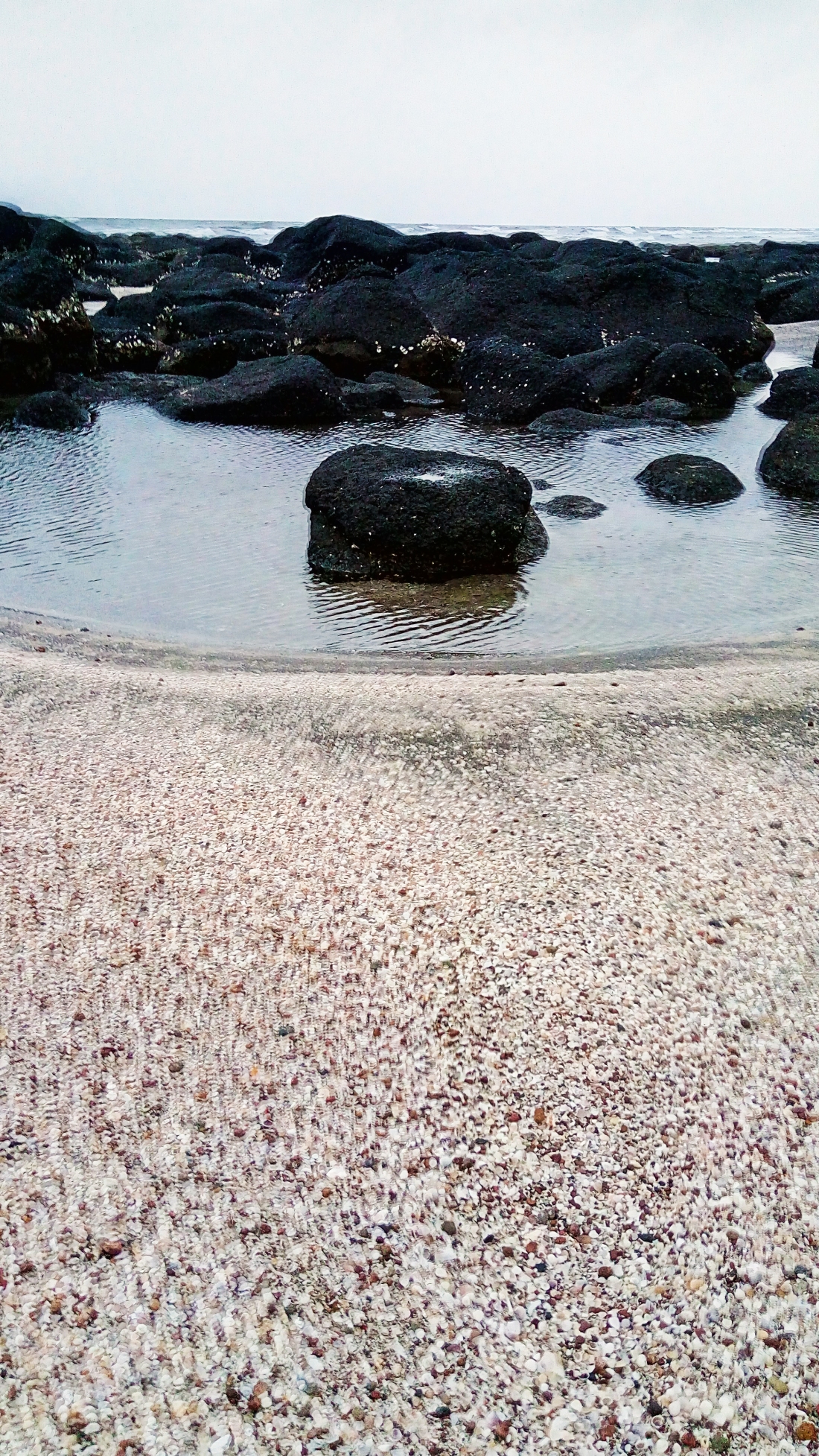 As disclaimer, let me share some more insight. While we were strolling in the rocky portion of the beach, little did we know how situations could dangerously change. To us the rocks didn’t appear resting on one another, rather they appeared to be kept on the sand. Chances are that that was just a surface arrangement. There have been instances, where due to pressure, sand between the rocks has sunken, dropping people over them in a ditch; Waves are the last nails in the coffin, if a high tide comes, the ditch one fell in would be filled in no time. Imagine how painfully unfortune end it could be. Kindly enquire with the locals, or the appropriate agency before exploring a new area.
As disclaimer, let me share some more insight. While we were strolling in the rocky portion of the beach, little did we know how situations could dangerously change. To us the rocks didn’t appear resting on one another, rather they appeared to be kept on the sand. Chances are that that was just a surface arrangement. There have been instances, where due to pressure, sand between the rocks has sunken, dropping people over them in a ditch; Waves are the last nails in the coffin, if a high tide comes, the ditch one fell in would be filled in no time. Imagine how painfully unfortune end it could be. Kindly enquire with the locals, or the appropriate agency before exploring a new area.
We had to finally bring our adventure to an end. The discussion that evening was on naturopathy and how one could increase immunity, and body nutrition without taking tablets, or vigorous dietary alternatives. The discussion was headed by someone retired from the Indian army, based on his experience of life. The discussion went in degrees I don’t fully acknowledge, and thus find it too early to translate here. However, I did pick up certain habits for self. Hopefully the next time I meet my parents, they would register some (positive) differences. Next day, we had to travel back to Khed, and catch our train back to Mumbai.
Luckily, next day the Sarpanch had (finally) come to meet our group! This was a much awaited opportunity for us. There was so much we could know about the Karde now, but had a train to catch. Nevertheless the confluence proved to be worth the wait. With him we learned of how ‘politics’ in his region worked. He was a pass-out from the Dapoli Agriculture University; the farmers initially resented his presence in the fields. He wasn’t respected or accepted as far as ‘farming’ was considered. It wasn’t because of who he was, but because he was holding a degree in four years from some city university. It was clash of experience and education. There were farmers, people who had followed a process from years and years, without education, without a degree, and now someone with modern education was talking of change. If you ask me, it was genuine worry which the farmers held. They chip in their days and nights farming, and a minor change in that could result in a disaster lasting for a season. They won’t trust you because they have survived with whatever they have done so far, whether right or wrong. You on the other hand have read the rules, and know the resistive degree; you know the threshold of change, and also the breaking point. Again, all theoretically. Perhaps this is what the catch-22 situation is. They won’t change because they don’t know. They will do what they do because they don’t know.
Sarpach, had to get down, on his own, to show them the differential for others to acknowledge. It was his success that slowly he was popular, he was respected, and years later he ran for election. Something which he had highlighted about his village was the simplicity and peaceful decorum which his people exhibit. During election promotion, unlike other villages, no freebies are gifted, no loudspeakers are setup, and they don’t talk of pulling others down, but explain to people of how they will lift the village further above.
Sarpach had a vision for his village. His team wanted to convert the village into a tourist attraction. On that I really wanted to talk with him about the environmental cost, but I lacked a decorous composure, as wore by him. He wanted every tourist to take back with them a delightful experience, as it will be the people, state, region, and the country they will remember, and not the village. This idea of his had won our hearts, he wasn’t talking with shallow intents, but with a firm thought through motive. The decorum and discipline with which he laid out his words were enough a guarantee of his bearing. It is a big deal to think of what a tourist takes back, bigger to understand how people tend to generalize and mix local experiences with national. As in do you care of what that tourists thinks of while they are here? ‘Athithi devo bhava’ is what he referred to.
Though a long plan, he had started to lay down the foundations for the same.
Talking with him we realized how modern-education sometimes, or perhaps the education system of India, destroys irreplaceable chunks of a society. A whole profession of coconut trade was wiped-out as the locals stopped training their children for it, and the elders were just too old to deal with it. Today, children after having a degree go to big cities to work, they don’t wish to carry forward their age-old business due to earning differences. Of course, the way society is, after graduation will you go get a job in Mumbai or climb trees in Karde for fruit hunting? Not all were like the Sarpanch who had come back to his village. He wanted his village to be a prominent location on the counties’ Map. That was the political setup of the village. That, with many more, were the aims with which villagers were taking part in the political operations.
A lot of my friends, people who I know, or even their friends and relatives, do not vote. They don’t shy away with cribbing and complaining, but just wouldn’t vote. For them it is mere inconvenience; of course it’s so easy to re-share what’s pop, but that’s where it ends. It doesn’t transcend beyond their Facebook page, or even contextual-abstract-reasoning. By not voting, I firmly believe that, one rejects the political model of the country. They don’t want to exercise their duties, but want rights. They want freedom, but do not wish to maintain it. They gave power to others to vote, who decide the ruler. More like shifting blames? Not voting, superficially seems an easy way to eat away, but in reality whether you do or don’t, you end up being part of a mess. Kudos to your political belief, if you can’t solidify it.
Here is a village which has a vision! Here are people who vote accordingly; here is a society which cares for itself, which is aware, and active; here is a village which is working on education, working towards an experience for others. A society which is slowly embracing a modern inclusive culture, here are people who are motivated to be part of something bigger then themselves; and here is also a society where women are not taxed for walking freely through the night.
This was our discover of Karde, a small, less heard of, lesser known of, village along a coastal edge of India.


